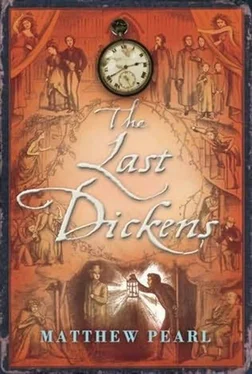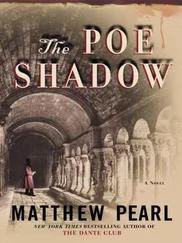“I said to him, ‘Edward, my son. Eddie. You have not done what your mother thought you did, you would not, would you?’ And he looked right at me, he looked into my eyes, Mr. Osgood, like this…”
It was another minute before Trood could finish his line of thought, saying Edward had admitted to the deed.
“I didn't see no harm in it,” added Edward. Then Edward's eyes filled up and he fell to the floor weeping and kicking. The tears had held William in check momentarily.
But William Trood knew he had no choice. He banished the fifteen-year-old from their house and from his family.
William's wife became utterly fragile with depression and soon dropped into the grave. She had been ill for years, but still William blamed her final turn on the dark influence of their son. William's spinster sister Elizabeth moved in with him to help him manage the Falstaff. Hearing of her nephew's actions, the very first thing Elizabeth said was, “Like Nathan!”
That was the last she said of it. Elizabeth forbade any mention of Nathan Trood under the roof of the Falstaff Inn.
NATHAN TROOD WAS William's older brother. Nathan, in his formative years, had displayed all the mischief of his future nephew, Eddie, without any of the sympathetic and sad aspects, without the excuse of being a cripple. Sullen, lazy, mocking, nasty: that was Nathan Trood from the time he was old enough to speak, and old enough to speak meant old enough to lie. William's father, who had taken his family from Scotland to Kent, used to say Nathan was a mere nasty shadow of a real boy, a coarse creature with a bright red nose from too much crying that could not be stopped even when he was dosed with the strongest powders. Edward had only met his uncle Nathan once while a boy. Nathan, who lived in London ever since he had run away as a youth, had appeared-without invitation-at Edward's sixth birthday celebration, a simple gathering with some townsfolk and two specially made puddings.
That very moment: Nathan flashing his rotted, yellow teeth while pinching the boy's cheeks and rustling his hair. That was the moment William blamed, deep down in his soul, for turning Eddie forever-as though some magic dust laced with death had passed from the man's breath into the child's heart. The long-estranged Nathan, by all accounts, had transformed into an even more nefarious man than he had been a boy. It was said he frequently visited dimly lit rooms in the darkest corners of London filled with opium smokers who hailed from China and other heathen lands. He consorted with scoundrels, prostitutes, smugglers, thieves, and derelicts-and in them he found his income and his avenues of pleasure.
After mourning his wife's death and his son's betrayals, William had tried his best to forget banished Edward. But how to forget a man's only son? The task was impossible; attempting it was itself too painful and left William feeling clouded by sentiment and self-recrimination. All Rochester whispered about the lost cripple. William knew it. Kentish townspeople shared stories of other people's failures like they were singing carols house-to-house at Christmastime. Then William, through the whispers, heard something new: Edward, after his banishment from home, had sought sanctuary with Nathan, who had happily taken in the errant nephew he had not seen for almost ten years. Nathan's revenge on a family that never accepted him had come to pass.
In time Nathan was said to have treated Edward as though he were his own son. He brought him to meet his friends and associates. The physical suffering caused by Edward's clubbed foot was soothed by the opium-eating habit taught by Nathan.
Not to say the relationship between uncle and nephew was purely harmonious. Edward (William would hear much later, when it was all done) actually behaved on the whole quite well with his uncle, forgoing any tendencies of rebellion he had cultivated in Rochester- perhaps because he knew consequences would be severe with Nathan. Yet Nathan's generous instincts toward his nephew only appeared in bursts, to be regularly replaced by scowls, threats, and demeaning insults. There were persistent rumors of a young lady in London that had set Edward's heart aflame, and Nathan's ire having been provoked by the younger man's prospects at happiness. Whatever caused the breach between the two, Edward soon disappeared. After much searching by a number of his new friends, it was discovered that he had gone abroad without telling a soul. It was said that in the course of these adventures, like so many other English boys his age, he sailed through Hong Kong and other exotic ports. When he returned to London eight months later he was welcomed home by his uncle.
Still, the young sailor and his uncle descended into a dangerous routine of perpetual indolence and indulgence in opium. Nathan seemed by his gaunt appearance and alternately drowsy and combustible manner to have become decidedly more dissatisfied in the last year. Even his wretched neighbors wanted nothing to do with Nathan. Then, Edward disappeared again.
“Who would think anything of it, less than a year after the last time he left voluntarily to go out to sea?” William asked. “I was told later that no one in their dingy quarter had any concerns. Not even his uncle Nathan. Especially not his uncle Nathan.”
In fact, new whispers had started (for they also exist in London, only with a harsher undertone than in Rochester). It was said that Nathan and Edward had an ugly row about an opium enterprise that involved friends of Nathan's. These whispers told that Nathan had murdered Edward, or had paid some other men to have Edward killed, and that with the aid of his villainous compatriots they disposed of the young man's body where it could never be found. Whatever had happened this time, the fact was Edward never came back.
Nathan, increasingly sickly, soon after died in debt and in misery. William was sent for as the nearest relation and was charged with disposing of the small house in a dingy quarter of London. The house was the picture of disorder-to William's surprise, Nathan, who had thrown away his whole family so long ago, had apparently never thrown away anything else. Rats and other vermin overran the place. In the hopes of selling the old house to liberate himself of the burden, William and a hired workman made some small structural renovations and repairs.
They were removing the rotting foundation of a wall when it happened. A sheet of canvas unraveled from above and a full skeleton of human bones fell on top of them. The skeleton, William knew instantly, was that of his son Edward Trood. The rumors were true.
“IMAGINE, IF YOU CAN, Mr. Osgood and Miss Sand, your child's bones raining down upon your head! There is no horror that could compare to that, my last embrace with my boy. Even though we had parted ways in red anger, I confess that as the years had passed, more and more I had imagined seeing my dear son, Eddie, at my fireside again. I had merely fancied him in my imagination away at sea- sometimes I do still, and surrender to my tears when nobody is watching.”
He tried to catch his breath again in spurts.
“Oh, Mr. Trood,” Rebecca said with sympathy, “it is your right to grieve. I lost my brother without saying good-bye, and now I must say good-bye to him every day.”
Giving up hope of a strong demeanor before his tenants, the grateful landlord began to weep on Rebecca's shoulder. When he had recovered himself, he led his guests outside behind the cathedral.
“What did the police say when you found his bones?” Osgood inquired.
Trood stopped in the burial yard, at his family plot. “Mr. Osgood, I never sent for them. Nor do I regret that decision.”
“But why?”
The landlord sat on the ground like a child, placing one trembling hand on the humble tablet for his wife and the other on his son's.
Читать дальше












